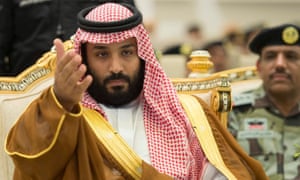
Saudi Arabia’s crown prince, Mohammed bin Salman, has launched a broad crackdown on dissent, targeting clerics, public critics and political rivals, as he moves to consolidate his newfound power amid a standoff with Qatar.
The campaign has led to the detention of up to 10 popular clerics – the biggest mass arrest of its kind in the kingdom’s recent history. It follows a failed recent attempt to end the three-month feud between Riyadh and its tiny neighbour, which has defied calls to sever links with the Muslim Brotherhood and Iran, whom the oil-rich state and its allies in the Gulf view as subversive threats.
The clampdown also comes amid ongoing speculation that Prince Mohammed is positioning himself for an ascension to the throne, perhaps as early as the first half of next year. The claim has been strongly denied by the royal court. However, figures close to the seat of power insist that plans have been made for an accession – but on terms to be set by the incumbent monarch, King Salman, the crown prince’s father.
The arrests of the clerics – and recent departure from Saudi Arabia of high-profile dissenters – come after a campaign launched in June against Qatar by Riyadh and the United Arab Emirates, which has since led to an air, land and sea blockade, trade sanctions and a series of demands that have so far not been met.
At the same time, Mohammed bin Nayef, the senior royal family member ousted by Prince Mohammed as crown prince, remains in effect under house arrest, while other senior princes have been prevented from travelling.
Senior figures inside Saudi Arabia say the crackdown is aimed at sidelining influential clerics who the royal court believes have been muted in their support for the stance against Qatar, which some senior officials believe has exposed the limits of Saudi power, rather than showcasing its strength.
“This [crackdown] needs to be viewed through the prism of Qatar primarily,” said one senior figure. “But it’s also about eliminating any other potential rival power bases on the home front for an eventual ascendancy to the top job. He remains wary of anyone connected to Mohammed bin Nayef, or the old guard.”
A poet, a university professor and a well-known businessman were also among those detained. However, attention has focused on the clerics Salman al-Odah, Awad al-Qarni and Ali al-Omari, all of whom have extensive reach in Saudi society, where they have attracted millions of social media followers. Salman al-Odah alone has more than 14 million Twitter followers.The country’s top religious body and state media supported the arrests, with the latter accusing the clerics of being aligned to the Muslim Brotherhood. The State Security Directorate said it had arrested people who were aligned to “foreign powers”.
“It is a big risk to take these people on in such a way, but the 32-year-old crown prince has got authority from [the king] to do what he wants,” the senior figure said. “He demands total loyalty and will get rid of anyone who he thinks doesn’t offer that.”
The ageing monarch gave his son a broad remit to transform the oil-dependent Saudi economy and partially reform its society when he moved Mohammed bin Nayef aside on 21 June.
The centrepiece of the planned economic reforms is a selloff of 5% of Aramco, the state-owned oil conglomerate, which is thought to be the world’s biggest company. Investors in the Gulf and in London say contingency plans are being made for a delay to the initial public offering of Aramco, which, if true, would be a significant setback for the ambitious leader. Robust foreign policy moves, such as a war in Yemen, and the Qatar standoff are also yet to yield results.
“He needs to make things happen,” said a second insider of Prince Mohammed. “If he doesn’t he may be seen as weakened by his rivals. He doesn’t want that. His inner circle has been telling him that now is the moment to go for the top job. The king is disengaged and doesn’t want to be bothered, so he is doing all he can to shore up power. He runs the risk of overreaching.”

No comments:
Post a Comment